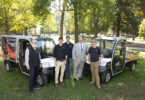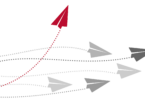Athens, Ga. – The University of Georgia has simple goals when it comes to waste management—drastically reduce waste and make it equally as easy to recycle as it is to throw something away.
On all parts of campus, students, faculty and staff are working to showcase and increase UGA’s efforts to be more sustainable.
Lindsay Pennington, a senior from Albany majoring in sculpture at the UGA Lamar Dodd School of Art, is challenging the way people think about waste. Her senior exit show, “The Salon from Refuse,” features sculptures from discarded materials and converts a 40-yard dumpster into a gallery for visual and performance art. The exhibit opens Nov. 15 on America Recycles Day in the school of art with a reception from 7-9 p.m. and will close Nov. 24.
The exhibit is co-sponsored by the UGA Office of Sustainability and Facilities Management Division, both of which are working to change the way the UGA community thinks about—and manages—its waste.
Starting in September, the UGA Facilities Management Division installed 30 solar-powered mixed-recycling and landfill compactor stations at high-traffic locations on the Athens campus. In general, all paper, plastic, metal and glass items go in the recycling bin; food wrappers, food waste and Styrofoam items go in the trash. The project employs renewable solar power and advanced communications technologies to maximize collection efficiency by campus staff.
After two months of operation, the project has produced significant results. The new system replaces 150 existing trashcans. Recycling in these areas has increased from less than 2 percent to 47 percent of items captured and diverted. Approximately 2.35 tons of materials were recycled and sold instead of ending up in the landfill during the first two months of use.
At this rate, the project will divert more than 56,000 pounds of additional materials from the Athens-Clarke County landfill each year.
“The new solar-powered recycling and trash bins are awesome,” said Tiffany Eberhard, an environmental health science major from Athens who leads the Bag the Bag campaign to reduce plastic bag waste on campus and in the local community.
UGA’s 2020 Strategic Plan calls for diverting 65 percent or more of the waste generated on campus from local landfills. The solar-powered waste reduction stations are one solution toward meeting these goals—and saving money. The program reduces costs through avoided landfill tipping fees, redirected staff time and reduced fuel use. The time required to collect and transport materials in the project area has been reduced by more than 90 percent, from 30 hours per week to only 2.5 hours per week, allowing UGA employees to focus on other concerns.
According to Tom Satterly, assistant vice president for the Facilities Management Division, the division “is leveraging technology to perform our duties. Big Belly bins enable just-in-time collection, saving us labor, time and fuel while ensuring there are no overflow issues on the campus. Implementing a winning ‘human-plus-machine’ strategy, the division is freeing up time for our staff to perform other valuable tasks.”
All visitors to campus are encouraged to try out the new solar-powered recycling and trash bins and to help UGA “put waste in its place.”
For more information on waste reduction strategies at the University of Georgia, see http://sustainability.uga.edu/what-were-doing/campus-operations/recycle/. For more on the “Salon from Refuse,” see http://sustainability.uga.edu/salon-from-refuse/. For more on Big Belly Solar compactors, see http://bigbellysolar.com/. And, for more on America Recycles Day and to take the “I Recycle” Pledge, see http://americarecyclesday.org/.







